Solar eclipse of October 1, 1940
A total solar eclipse occurred on Tuesday, October 1, 1940. A solar eclipse occurs when the Moon passes between Earth and the Sun, thereby totally or partly obscuring the image of the Sun for a viewer on Earth. A total solar eclipse occurs when the Moon's apparent diameter is larger than the Sun's, blocking all direct sunlight, turning day into darkness. Totality occurs in a narrow path across Earth's surface, with the partial solar eclipse visible over a surrounding region thousands of kilometres wide. Totality was visible from Colombia, Brazil, Venezuela and South Africa.
| Solar eclipse of October 1, 1940 | |
|---|---|
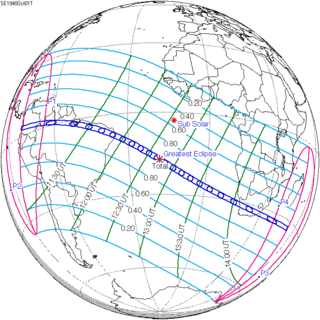 Map | |
| Type of eclipse | |
| Nature | Total |
| Gamma | -0.2573 |
| Magnitude | 1.0645 |
| Maximum eclipse | |
| Duration | 335 sec (5 m 35 s) |
| Coordinates | 17.5°S 18.2°W |
| Max. width of band | 218 km (135 mi) |
| Times (UTC) | |
| Greatest eclipse | 12:44:06 |
| References | |
| Saros | 133 (41 of 72) |
| Catalog # (SE5000) | 9376 |
Related eclipses
Solar eclipses 1939–1942
This eclipse is a member of a semester series. An eclipse in a semester series of solar eclipses repeats approximately every 177 days and 4 hours (a semester) at alternating nodes of the Moon's orbit.[1]
| Solar eclipse series sets from 1939–1942 | ||||||
|---|---|---|---|---|---|---|
| Descending node | Ascending node | |||||
| Saros | Map | Saros | Map | |||
| 118 | April 19, 1939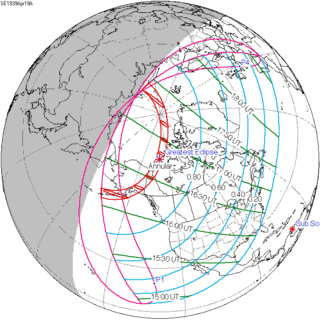 Annular |
123 | October 12, 1939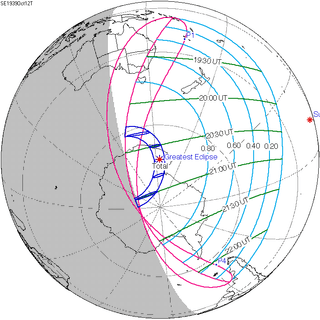 Total | |||
| 128 | April 7, 1940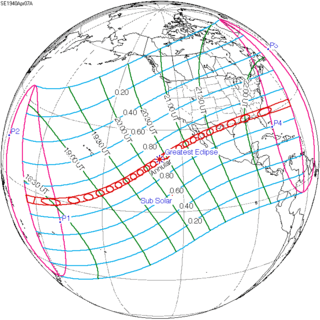 Annular |
133 | October 1, 1940 Total | |||
| 138 | March 27, 1941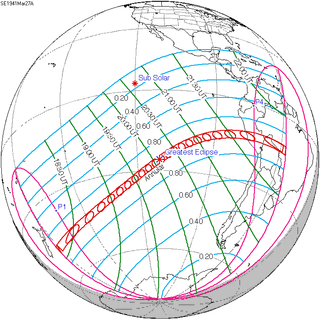 Annular |
143 | September 21, 1941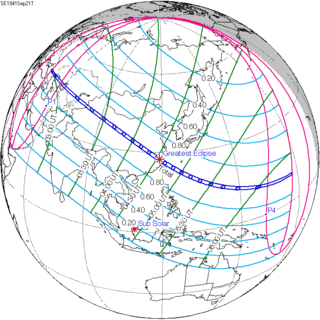 Total | |||
| 148 | March 16, 1942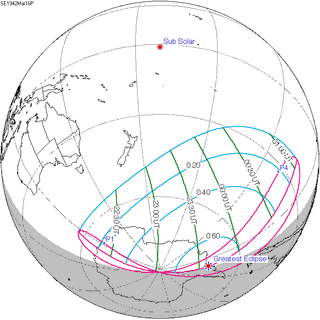 Partial |
153 | September 10, 1942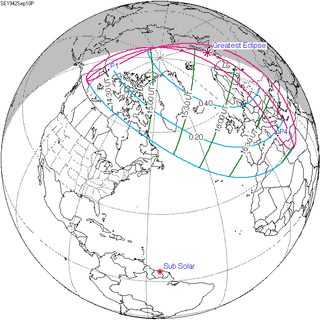 Partial | |||
| The partial solar eclipse on August 12, 1942 occurs in the next lunar year eclipse set. | ||||||
Saros 133
Solar Saros 133, repeating every 18 years, 11 days, contains 72 events. The series started with a partial solar eclipse on July 13, 1219. It contains annular eclipses from November 20, 1435, through January 13, 1526, with a hybrid eclipse on January 24, 1544. It has total eclipses from February 3, 1562, through June 21, 2373. The series ends at member 72 as a partial eclipse on September 5, 2499. The longest duration of totality was 6 minutes, 49.97 seconds on August 7, 1850.[2] The total eclipses of this saros series are getting shorter and farther south with each iteration. All eclipses in this series occurs at the Moon’s ascending node.
| Series members 30–56 occur between 1742 and 2211 | ||
|---|---|---|
| 30 | 31 | 32 |
| June 3, 1742 | June 13, 1760 | 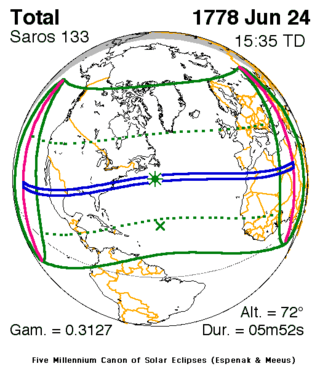 June 24, 1778 |
| 33 | 34 | 35 |
| July 4, 1796 | July 17, 1814 | July 27, 1832 |
| 36 | 37 | 38 |
| August 7, 1850 | 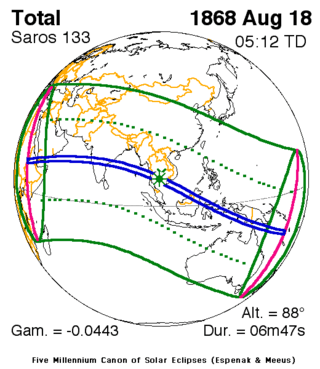 August 18, 1868 |
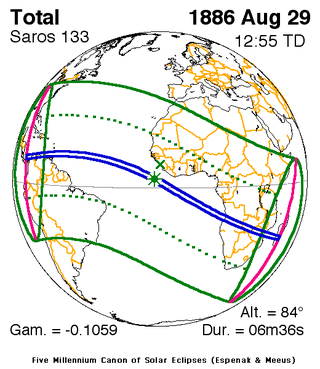 August 29, 1886 |
| 39 | 40 | 41 |
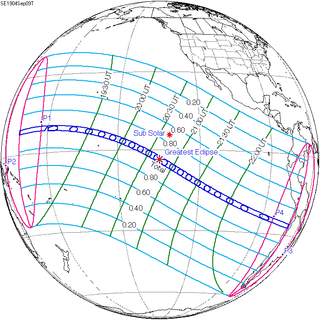 September 9, 1904 |
 September 21, 1922 |
 October 1, 1940 |
| 42 | 43 | 44 |
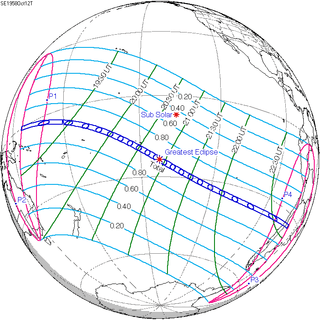 October 12, 1958 |
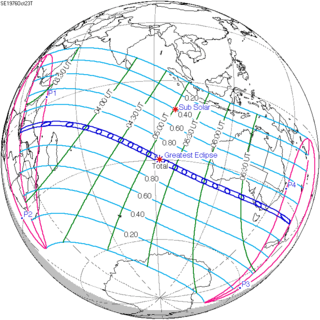 October 23, 1976 |
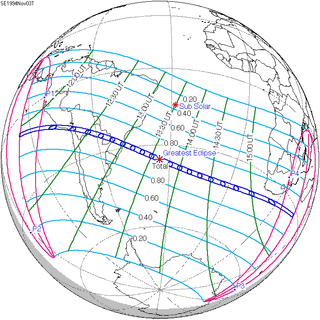 November 3, 1994 |
| 45 | 46 | 47 |
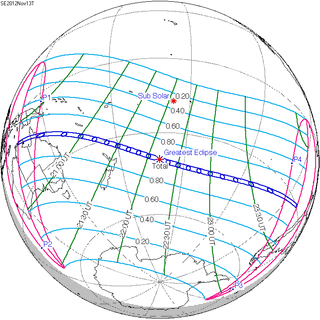 November 13, 2012 |
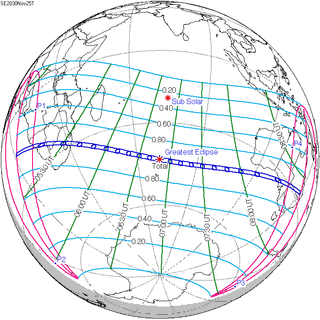 November 25, 2030 |
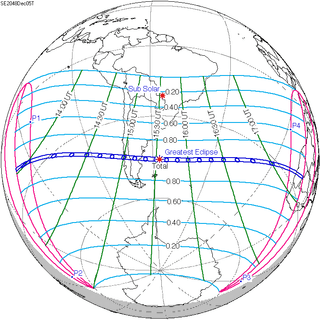 December 5, 2048 |
| 48 | 49 | 50 |
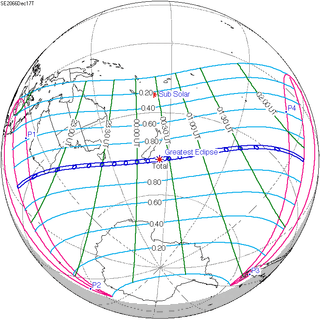 December 17, 2066 |
 December 27, 2084 |
 January 8, 2103 |
| 51 | 52 | 53 |
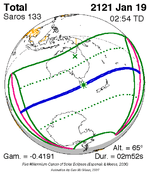 January 19, 2121 |
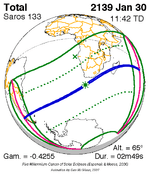 January 30, 2139 |
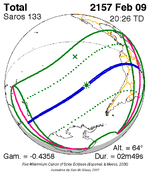 February 9, 2157 |
| 54 | 55 | 56 |
 February 21, 2175 |
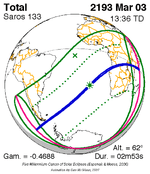 March 3, 2193 |
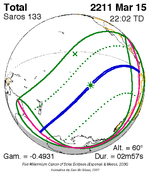 March 15, 2211 |
Metonic series
The metonic series repeats eclipses every 19 years (6939.69 days), lasting about 5 cycles. Eclipses occur in nearly the same calendar date. In addition, the octon subseries repeats 1/5 of that or every 3.8 years (1387.94 days).
| 21 eclipse events between July 21, 1906 and July 20, 1982 | ||||
|---|---|---|---|---|
| July 20–21 | May 9 | February 24–25 | December 13–14 | October 1–2 |
| 105 | 107 | 109 | 111 | 113 |
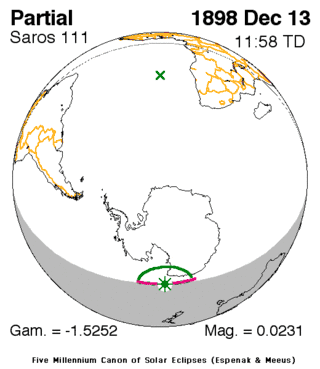 December 13, 1898 |
||||
| 115 | 117 | 119 | 121 | 123 |
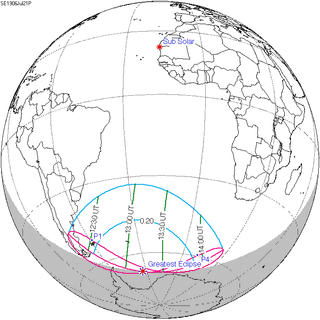 July 21, 1906 |
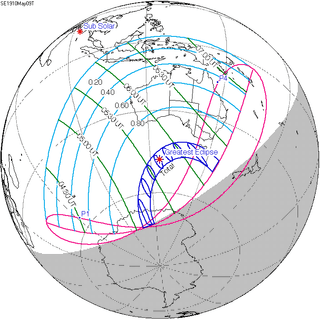 May 9, 1910 |
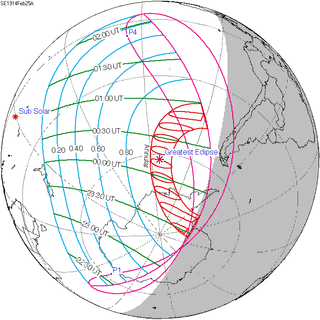 February 25, 1914 |
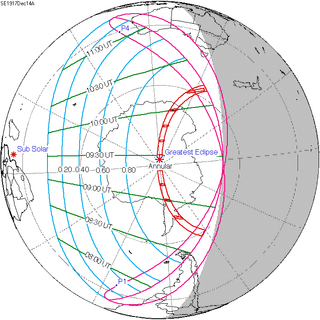 December 14, 1917 |
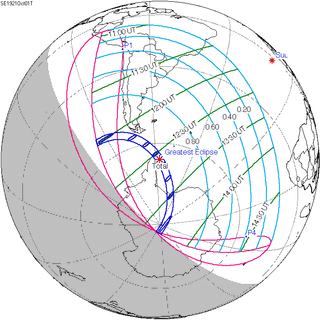 October 1, 1921 |
| 125 | 127 | 129 | 131 | 133 |
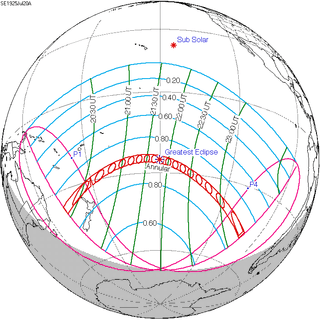 July 20, 1925 |
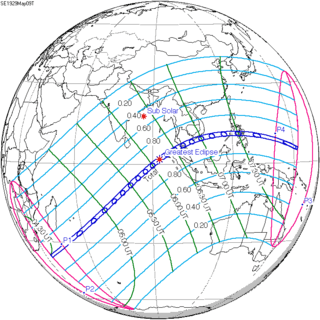 May 9, 1929 |
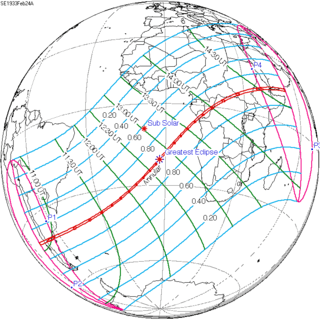 February 24, 1933 |
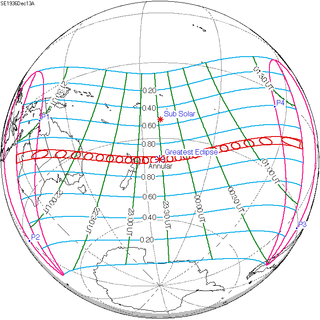 December 13, 1936 |
 October 1, 1940 |
| 135 | 137 | 139 | 141 | 143 |
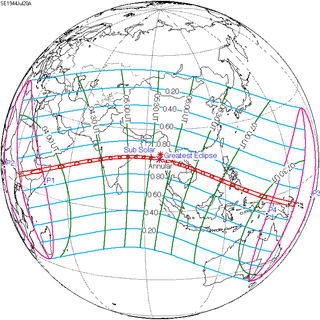 July 20, 1944 |
 May 9, 1948 |
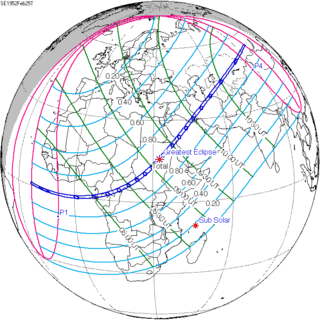 February 25, 1952 |
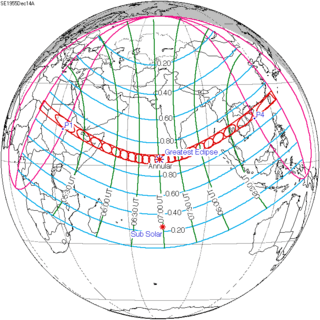 December 14, 1955 |
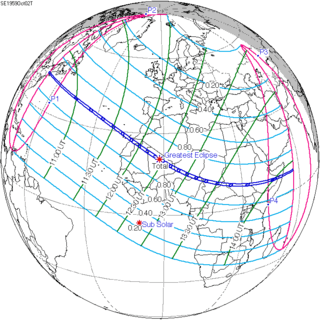 October 2, 1959 |
| 145 | 147 | 149 | 151 | 153 |
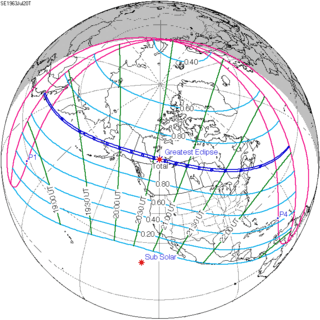 July 20, 1963 |
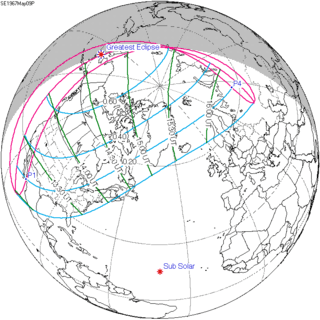 May 9, 1967 |
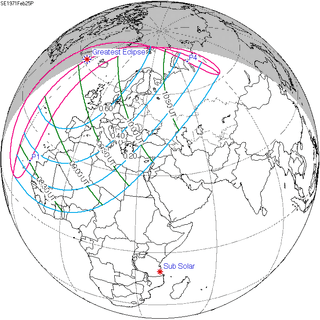 February 25, 1971 |
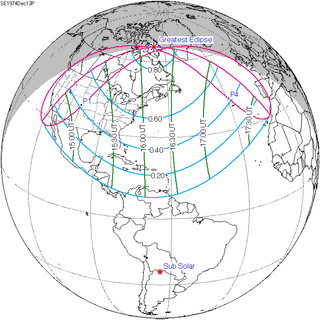 December 13, 1974 |
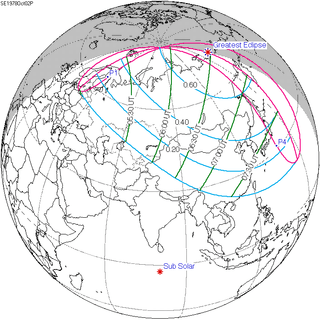 October 2, 1978 |
| 155 | ||||
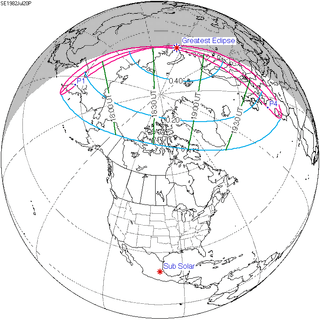 July 20, 1982 | ||||
Notes
- van Gent, R.H. "Solar- and Lunar-Eclipse Predictions from Antiquity to the Present". A Catalogue of Eclipse Cycles. Utrecht University. Retrieved 6 October 2018.
- http://eclipse.gsfc.nasa.gov/SEsaros/SEsaros133.html
References
- Earth visibility chart and eclipse statistics Eclipse Predictions by Fred Espenak, NASA/GSFC
.jpg)
